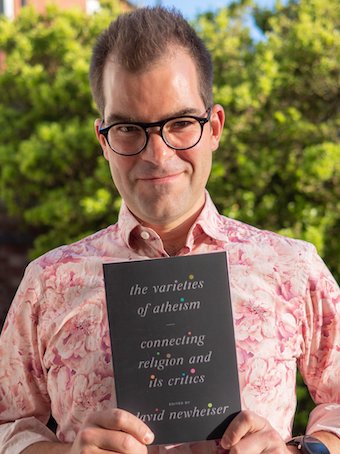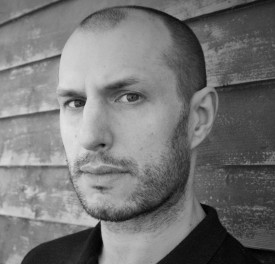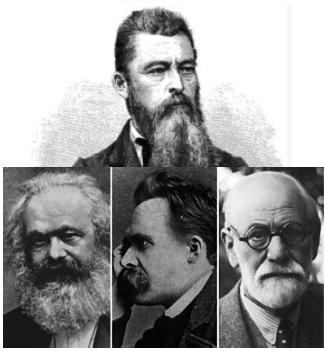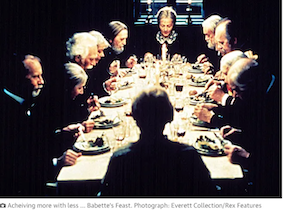
Varieties of Atheism has rekindled my interest in atheism as an identity and as a question for wider social consideration. One can take one’s identity for granted and risk becoming stale, ossified, a life that is lived the same day after day without any further inward understanding or self-awareness. So it’s good to read the points David Newheiser raises and to follow the leads to other readings that he offers.
In one place in Varieties Newheiser writes:
. . . atheism concerns motivations that run deeper than reason.
I consult the endnote. It reads:
Stephen LeDrew argues that the New Atheism is likewise motivated by political commitments rather than science alone. Stephen LeDrew, The Evolution of Atheism: The Politics of a Modern Movement (New York: Oxford University Press, 2016), 2. Susannah Ticciati develops a similar argument in her contribution to this collection.
Since I’m more interested in politics than theology I’ll put the theologian on hold for a moment and have a look at what LeDrew has to say (2016) —
. . . New Atheism is a secular fundamentalism, a modern utopian ideology that is also an active movement for social transformation. Like all fundamentalisms, it is not only a position on metaphysical questions but an essentially political phenomenon. It is only manifestly a critique of religion, while its latent project is the universalization of the ideology of scientism and the establishment of its cultural authority. Its critique is therefore not just about religion but more precisely about cultures, belief systems, and forms of knowledge—most importantly the social sciences and humanities, redundant in the New Atheism’s Darwinistic master narrative—that are perceived as challenges to this authority.
While ostensibly a critique of the dangers of irrational superstitions, then, the New Atheism is ultimately about power—more specifically, socially legitimate authority. It is a response to challenges to the authority of science and, by extension, those who practice science and regulate its institutions. By a further extension, it is a defense of the position of the white middle-class Western male, and of modernity itself, which is perceived to be under threat by a swirling concoction of religious ignorance, epistemic relativism, identity politics, and cultural pluralism. The New Atheism is a reaction to twenty-first-century challenges to the established modern social hierarchy and structure of cultural authority, seeking to eliminate perceived challenges to scientific authority not only from “premodern” religion but also “postmodern” social science. This is an attempt at placing an ideological manifestation of the natural sciences in a position of uncontested authority in the production of legitimate knowledge and in the cultural sphere of meaning and normativity.
I knew there was a reason I felt a certain discomfort with some of the writings of Dawkins, Harris, and even Hitchens.

I’m a history buff so I could not turn away from LeDrew’s first chapter, The Evolution of Atheism.
As noted in an earlier post, LeDrew points out that “explicit, “avowed” atheism emerged in the Enlightenment” — and from that perspective it is a modern “movement”:
. . . “atheism” is inextricably bound up with a tradition of Enlightenment principles, including emancipation through reason, liberal democracy, the primacy of the individual, scientific rationality, and the notion of progress, which is closely related to the theory—or as Asad describes it, the “political doctrine”—of secularization . . . (p. 13)
I did not know so much has been written about atheism. LeDrew introduces his discussion by pointing to two key sources for his information:
- David Berman’s A History of Atheism in Britain: From Hobbes to Russell
- Michael J. Buckley’s twin volumes, At the Origins of Modern Atheism and Denying and Disclosing God: The Ambiguous Progress of Modern Atheism.
So LeDrew draws a distinction between “scientific atheism” and “humanistic atheism”.
Scientific atheism views religion primarily as the antithesis of science and an obstacle to social and scientific progress. . . [It] understands religion as an obstacle to science-driven social progress and seeks to eradicate this relic of the premodern world through science education and “enlightenment”.
Humanistic atheism [considers] religion to be primarily a social phenomenon rather than an attempt at explaining nature . . . [It] rejects the structure of a world that gives rise to religion, which from this perspective is not a challenge to modernity but rather provides ideological support for modernity by rationalizing its inequities. It imagines alternative social formations that would cause religion to vanish. (p. 14, my formatting and bolding in all quotations)

New Atheism as scientific atheism
We might say that such an analysis provides us with 20-20 vision and through it LeDrew focuses on the New Atheism thus:
The New Atheism is not “new” but just the most recent incarnation of a particular kind of nonbelief from a particular intellectual tradition. It excludes other kinds of religious criticism . . . The New Atheism is much more than a critical inquiry into religious faith. It is an extension and manifestation of the modern project of scientific mastery of the world and the rationalization of society, and its critique is only ostensibly about religion. More implicitly, it is a critique of other perceived challenges to this political project, wherever they may come from—even from other kinds of atheism. (14f)
LeDrew explores an interesting discussion on the thesis that atheism emerged not from a direct antagonism to religion but ironically from within theological enquiries that sought to enlist science in support of some of its views. That discussion is beyond the scope of this post but one can find more about the idea in Buckley, Denying and Disclosing God, Kors, Atheism in France, and Turner, Without God, Without Creed.
“Scientific atheism”, LeDrew explains, was born from the union of Enlightenment scepticism and the social and scientific theories of evolution. We have heard of Herbert Spencer’s Social Darwinism. Here we find the beginnings of what many of us would view as the villain of modern times:
It is important to note that this idea of progressive social evolution, with its vision of a “natural unfolding of social complexity,” is predicated upon a misreading of Darwin, who viewed evolution as a process with no fixed direction and invoked the metaphor of a “radiating bush” to describe adaptation and differentiation. (LeDrew, p.24)
For Darwin “on God” see comment below.
It is crucial to note that for these early Darwinists, the theory of evolution was not simply a scientific fact that needed to be defended against irrational forces that would seek to discredit it. The theory of evolution was, from the beginning, tied to a certain political orientation. Darwin was born into a wealthy family of capitalists and scientists. This socialization proved determinative of his character and political views, which in turn were instructive in the development of his scientific theory. Informed by Darwin’s liberal-capitalist worldview, natural selection doubled as a metaphor for the right of individuals to pursue their self-interest in a free and competitive society. Soon after its publication, Huxley declared Origin of Species to be a gun in the armory of liberalism, the most effective new weapon for attacking superstitious beliefs and thus promoting rational materialism.
Evolution was clearly not politically neutral in the minds of its defenders. Rather, the idea was tied to liberalism and rationalism and used to promote modern goals and values, and thus transcended science to become a cornerstone of the political ideology of the Victorian liberal intelligentsia. Indeed, many scholars agree that Darwin’s theory not only validated his political views but itself was a product of Victorian culture, with Darwin early in his scientific career committing himself to a theory of nature that reflected the Malthusian socioeconomic inclinations of British high society.
In this view, the theory of natural selection was a contingent result of social history rather than an inevitable conclusion. As atheism became tied to the theory of evolution, it moved from simple negation of religious beliefs to an affirmation of liberalism, scientific rationality, and the legitimacy of the institutions and methodology of modern science—and thus from religious criticism to a complete ideological system. (22f)
Thankfully LeDrew reassures atheists who are offended by that historical background:
. . . scientific atheism is not a necessary consequence of a Darwinian worldview but rather an ideology that uses “evolution” and “natural selection” as metaphors in the advancement of what is in fact a deeply political position. (25)
Humanistic atheism
 We come now to the history of “humanistic atheism”.
We come now to the history of “humanistic atheism”.
This brand of atheism emerged from the realization that merely rationally criticizing religious beliefs did not solve the nonrational problems that led to those beliefs, “which include alienation, suffering, infantile neurosis and insecurity, and fear of death.” We leave behind Auguste Comte, Herbert Spencer, Charles Darwin and Aldous Huxley and meet Ludwig Feuerbach, Karl Marx, Friedrich Nietzsche and Sigmund Freud.
These thinkers did not give much attention to the arguments against the existence of God. Rather, they tended to simply assume his nonexistence. They were interested in the social and psychological causes that led to belief in God and in sustaining a religion that maintained inequities and ignorance. We introduced Feuerbach in our previous post. I am embarrassed to have to admit I have never studied anything about Ludwig Feuerbach but LeDrew helps me understand and atone a little for my ignorance:
Given his role as a principal architect of one of the most important streams of atheist thought of the past two centuries, it is striking that Feuerbach is rarely mentioned today in popular or scholarly religious criticism. Feuerbach’s seminal contribution to the development of atheism was his theory of God as a projection of the human onto the divine figure, which is a projection of alienation: “Religion is the disuniting of man from himself; he sets God before him as the antithesis of himself.” That is, everything that is great about God is alienated from humanity. (27)
If you are more familiar with Karl Marx and the above sounds familiar, here is the reason:
This approach was adopted by Marx, who reconfigured Feuerbach’s theory by defining more precisely the nature of the human experience that resulted in the projection of God—that is, alienation. (27)
Freud, we know, also accounted for religion as an “illusion”. The comfort believers find in religion is understood as arising from our inner “fearful and wondering child . . . desperate for some measure of control over terrifying forces of nature . . . “. Quoting Freud, religion, then, is …
the system of doctrines and promises which on the one hand explains to him the riddles of this world with enviable completeness, and, on the other, assures him that a careful Providence will watch over his life and will compensate him in a future existence for any frustrations he suffers here. The common man cannot imagine this Providence otherwise than in the figure of an enormously exalted father.
Then there is Friedrich Nietzsche. We have all heard of “the death of God”.
. . . the notion of the death of God refers to the end of “belief in any sort of absolute centre or unshakable foundation.”71 It is a necessary step in the evolution of man, where man is a step between animal and Ubermensch, when humanity itself, rather than a distant God, becomes the meaning of Earth.72 Here we see a link between Nietzsche and Feuerbach’s theory of God as projected alienated humanity. That is, man cannot become Ubermensch—master of himself and creator of his own truth and morality—until God, the universalizing and alienating foundation of truth and morality, is “dead.”
Ah — how I recall my French classes from student days and reading Albert Camus and struggling to take in the full meaning of Existentialism.
. . . faith robs people of their own capacity for understanding . . .
Indeed, and in more ways than the one identified here (relying on the church to explain and provide meaning). A momentous turning point in my life came when it suddenly dawned on me that it was my “faith” that was my driver — it was not the object of my faith that was empowering me, giving me confidence, etc, but “faith” itself! I finally discovered I could cut out the middle (imaginary) man.
He describes religion as an illusion constructed as an escape from reality . . .
. . . In this sense Nietzsche can be placed in line with Marx and Freud in their diagnosis of religion as both an expression of suffering and compensation for it. This idea is expressed most forcefully in his disdain for Christian morality, which for Nietzsche is nothing other than a slave morality . . . (31)
I do not think Marx is obsolete and LeDrew reminds me of one of the reasons why:
For Nietzsche, then, as for Marx, religion turns our attention away from what is really important, which is human social relations, and toward the appeasement of a supernatural deity who has the power to end our suffering if only we are prepared to submit to his will—which, of course, is really the will of powerful clerics.
The biggest difference between these thinkers is perhaps in their attitude toward the oppressed. Marx is clearly empathetic, while Nietzsche derides the weak masses beguiled by the Christian slave morality, and Freud is equally contemptuous of the majority who are mired in an infantile fantasy and “will never be able to rise above this view of life. (32)
Incidentally, it was pointed out to me recently that Bruno Bauer (whose works I have been translating) was the first to declare that religion was the “opiate of the people”, and Marx borrowed the expression from him.
–o0o–

A theologian’s perspective
The other scholar Newheiser cited in his remark about atheism involving a “motivation that runs deeper than reason” is the theologian Susannah Ticciati who contributes a chapter in Varieties of Atheism.
Ticciati also takes me on a journey of discovery when in her introductory paragraphs on the debate with New Atheists she points out in passing….
- The thin narrative of progress underpinning some of the new atheist writings is exposed by Terry Eagleton (from a Marxist perspective) for its failure to recognize the radical nature of sin, and its political impotence in the face of the horrors of capitalism.
- David Bentley Hart offers a counterhistory in which the evils allegedly brought about by “religion” are placed in the context of an account of the Christian tradition as that which has (uniquely) fostered an ethic of love and compassion.
- Less sweepingly polemical, but sharing the dismissive tone of Eagleton and Hart, is Denys Turner’s apophatically rooted critique that such atheists deny a God that no self-reflective Christian would affirm, and that their denials are outstripped by the much more thoroughgoing denials of the apophatic tradition.
- Voicing a perspective from beyond the male-dominated battleground of the debate, Tina Beattie exposes from a feminist perspective the ideological situatedness of the new atheism’s scientism. Her nonpolemical approach arguably enables her to offer all the more deeply devast[at]ing a critique.
- David Fergusson, most measured of all, deliberately seeking a respectful engagement, points (among other things) to the complexity of the theological tradition as something that already houses the challenges thrown at it as if for the first time by the new atheists. Several of the theological contributors, finally, highlight the complementary rather than competitive relationship between science and theology. (85f)
The links in the above will take you to the particular work Ticciati had in mind in each case. Of course, I cannot simply sit and watch such interesting looking titles go without stopping the bus each time so I can get out and check them for myself.
Ticciati finds all of the above more or less lacking in one respect in their criticisms of the “new atheists”….. that is, their failure to hear and respond to
what is arguably the deepest concern being voiced by the new atheists—an ethical concern. (86)
Ticciati’s response is that of a theologian for her theologian peers. I confess I struggled to fully grasp her highly abstract discussion, though I imagine theologians would embrace the terms and arguments she uses as mere basics in their conceptual universe. It’s not my world and I attempt to outline her argument only with trepidation.

What is the practical impact of religion? Are beliefs harmful? Or is it only certain practices that we must worry about? After surveying the respective views of Daniel Dennett, Sam Harris and Richard Dawkins on these views, Ticciati refers to two quite different atheist perspectives:
- Alain de Botton, author of Religion for Atheists : a non-believer’s guide to the uses of religion, argues for the benefits of certain kinds of religious practice;
- Julian Baggini argues in Atheism: A Very Short Introduction that religion may be “false” but it is not necessarily “harmful”; reference is also made to an “immanent atheist religiosity” in Baggini’s presentations of Babette’s Feast (also a Guardian article).
(As I have said, Varieties of Atheism contains a wealth of introductions to new ideas or old ideas discussed in new ways!)
Ticciati responds to new atheist criticisms by bridging the gap between belief and practice and here she turns to 1 Corinthians 1:18-25
For the word of the cross is folly (μωρια) to those who are perishing, but to us who are being saved it is the power of God. For it is written,
“I will destroy the wisdom of the wise,
and the discernment of the discerning I will thwart.”Where is the one who is wise? Where is the scribe? Where is the debater of this age? Has not God made foolish the wisdom of the world? For since, in the wisdom of God, the world did not know God through wisdom, it pleased God through the folly of preaching to save those who believe. For Jews demand signs and Greeks seek wisdom, but we preach Christ crucified, a stumbling block (σκανδαλον) to Jews and folly (μωρια) to Gentiles, but to those who are called, both Jews and Greeks, Christ the power of God and the wisdom of God. For the foolishness of God is wiser than men, and the weakness of God is stronger than men.
Through an application of that text to the ethical questions raised by religion’s critics argues that a propositional belief (God exists; Christ crucified is the saviour of the world”; “Jesus is the Christ”) can only have meaning under certain conditions in which the believer lives in the transforming context of a “mutual upbuilding” community of fellow-believers. That’s surely a gross oversimplification of Ticciati’s argument but I hope it is enough to present an invitation for anyone interested to follow it up for elaboration. At the risk of quoting a passage out of the context in which it was meant to be read, some flavour of the discussion might be gleaned from her following words:
The “me” that utters “Christ is my savior” will always also be the perishing self that is dealt a death blow by this very claim. It must be made foolish in order to become wise. As I have shown, the more austere claim “God exists,” at least in its Christian rendition, has meaning only insofar as it is caught up in this dynamic. And for this reason, the critiques of the new atheists—however easy it might be to dismiss them on purely propositional grounds—must be heard as another invitation “to become a fool that [one] may become wise” (1 Corinthians 3:18).
. . . . .
Drawing on scriptural resources, I have developed an account of the relationship between the truth and transformative significance of two central theological claims: (1) “Christ crucified is the savior of the world,” and (2) “God exists.” In summary, I have argued that these two claims display their true meaning under the conditions of an economy of mutual upbuilding, in which stumbling over Christ as stumbling stone leads again and again to the rediscovery of Christ as cornerstone.
Personally, I prefer to read the atheist literature cited, or even selections from other theological responses that are simpler, keeping in mind Ticciati’s caveats about what she perceives to be their shortcomings. Everything is colourful. Nothing black and white.
LeDrew, Stephen. The Evolution of Atheism: The Politics of a Modern Movement. New York: Oxford University Press, 2015.
Newheiser, David, ed. The Varieties of Atheism: Connecting Religion and Its Critics. Chicago, IL: University of Chicago Press, 2022.
